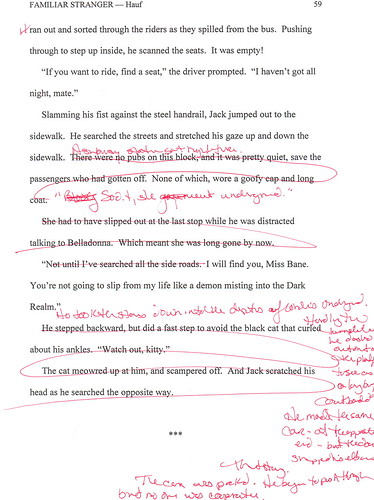Weak, unsupported, awkward, unclear, disorganized,
problematic, confusing, wordy: Even writing these words makes me cringe.
Rejection and criticism are hard to deal with, especially in
something as sensitive as writing. It’s your paper—your thoughts and ideas —that take the brunt of those harsh words. “Do they hate me??” might run through your mind.
 |
Look past the red pen! There's a masterpiece hiding inside... |
something as sensitive as writing. It’s your paper—your thoughts and ideas —that take the brunt of those harsh words. “Do they hate me??” might run through your mind.
Well, of course they don’t. They want you to improve. And
constructive criticism will help you to do that.
I know, I know: easier said than done. But, if you ever want
to succeed, you must use the criticism to patch the places where you are weak. It
is nearly impossible to judge your own writing, as you obviously know what you
mean. If someone looks at your work and says that there is nothing wrong, find
someone else who can read it. You’re not looking for trouble; you’re looking to
improve. The more feedback you get, the more you can refine your writing.
You might need to sit your writing aside for some time—for months
or even a year. Oftentimes this will help you to establish a more objective
point of view. The paper or piece will not be fresh in your mind, and therefore
you will be able to look at it anew. Plus, you will probably have written
pieces in the meantime. When you look back, you will undoubtedly be surprised
at how much you’ve improved. What can I say: practice makes (almost) perfect.
It difficult for any writer to ever say that their writing
is perfect, so don’t expect perfection. Expect for your professor or a
publisher to give you something to work on. There’s always another goal to
reach.
Yes, there are times where criticism is downright nasty. It
can be utterly mean. The most important thing to do is to NEVER GIVE UP! Anyone
can be a wonderful writer. The more you write, the more opinions you get, the
better you will be.
Having your peers workshop your paper will probably be one
of the most nerve-racking things you will do. To sit in class and listen to
your peers and professor discuss and analyze your work is hard. I can’t tell
you how many times my piece would be workshopped and someone would blurt out,
“I honestly had absolutely NO idea what you were trying to say.” It makes you
want to crawl in the corner with the mouse.
Fortunately or unfortunately, we can’t do that. And don’t
worry too much, because they always make sure to say the encouraging with the dispiriting.
I find it helpful to make a chart of the positives and negatives as they
workshop the piece, so that if I feel overwhelmed I can look at what I’ve done
well.
Oh, and remember: everyone gets criticized. Look up some
famous authors who were rejected: C.S. Lewis, Sylvia Plath, William Faulkner,
and even Anne Frank. None of these authors wore capes. If they faced criticism
and succeeded, so can you.
No comments:
Post a Comment